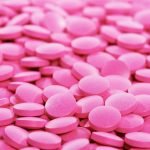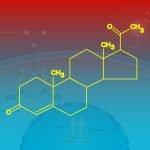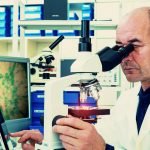Prostate Cancer: Advances in Botanical Medicine
Eric Yarnell, ND and Lauren Russel, ND
Prostate cancer is the most common invasive cancer and the second most lethal cancer in men. After the introduction of the total prostate specific antigen (tPSA) test in the late 1980s, detection increased dramatically, though mortality rates have remained largely unchanged. The promise of decreased mortality due to increased detection at screening and thus early treatment has not, so far, panned out (Ilic et al., 2006). Research is ongoing for potential herbal treatments for men with prostate cancer to avoid unnecessary invasive treatments and simultaneously increase quality of life while reducing mortality.
Pomegranate
Punica granatum (pomegranate) has been a staple of traditional Mediterranean medicine for millennia. Pomegranate has long been used as an astringent for diarrhea and parasitic intestinal infections (Felter, 1922). Pomegranate has more recently been shown to have strong antioxidant, inflammation-modulating and anti-prostate cancer properties.
In a recent study, pomegranate fruit was extracted and applied to highly aggressive cancer cells (Malik and Mukhtar, 2006). The pomegranate extract was effective in reducing cell proliferation and increasing apoptosis in these cells.
In a single-center, open-label phase II clinical trial over the course of two years, pomegranate polyphenols were studied for their potential therapeutic effects in men with recurrent prostate cancer (Pantuck et al., 2006). All men in the study had rising tPSA levels following prostatectomy or radiotherapy. Patients in the study consumed 8oz of pomegranate juice daily (containing 570mg of total polyphenol gallic acid equivalents) until meeting disease progression end points. tPSA doubling times rose significantly, correlating with slowed disease progression. Pomegranate juice is a simple addition to any protocol. Many patients are using low-price substitutes for the brand used in the study, which may or may not be a good idea. The only adverse effect is nausea. Pomegranate should not be taken with other supplements or medicines, as the tannins may mildly reduce absorption.
Inflammation-Modulating Botanicals
Research suggests that prostate intraepithelial neoplasia (PIN) is a precursor stage in the development of prostate cancer. Prostatitis and the infection and inflammation caused by sexually transmitted diseases also increase the risk of prostate cancer. Results of recent studies indicate that increased intake of antioxidants and inflammation modulators may help decrease the risk of prostate cancer or retard its progression. Clinical trials suggest that increased cyclooxygenase-2 (COX-2) may be involved in the carcinogenic process. COX-2 is often highly expressed in prostate cancer cells.
A proprietary herbal inflammation-modulating complex containing Rosmarinus officinalis (rosemary), Curcuma longa (turmeric), Zingiber officinale (ginger), Ocimum tenuiflorum (holy basil), Camellia sinensis (green tea), Polygonum cuspidatum (hu zhang), Coptis chinensis (goldthread), Berberis vulgaris (barberry), Origanum vulgare (oregano) and Scutellaria baicalensis (Baikal skullcap) is currently being studied. An initial case report discussed the utility of this formula in one patient with high-grade PIN (Raifalov et al., 2007). A preliminary clinical trial studying the effects of three capsules of this blend three times a day by mouth with food is in progress. Prostate biopsies will be taken every six months and serum PSA followed every three months for two years.
In a separate study, the inflammation-modulating and antineoplastic effects of Scutellaria baicalensis root extracts were assessed against androgen-dependent and -independent human prostate cancer cell lines (Ye et al., 2007). Application of S. baicalensis was associated with growth inhibition in both cells’ lines that was both dose and time dependent. Much more work should be done with inflammation-modulating botanicals to determine the full extent of their benefit in prostate cancer patients.
Insulin, Luteolin, Cinnamon and Cloves
Prostate cancer is associated with overexpression of insulin-like growth factor 1 receptors (IGF-1R), which stimulate cellular proliferation. Luteolin, a common flavonoid, has been shown to inhibit IGF-1R and block the proliferation of three prostate cancer cell lines (Fang et al., 2007). This fits neatly with recent evidence that a vegan diet, associated with low insulin levels, along with exercise and stress reduction can lower tPSA levels in men with localized prostate cancer (Ornish et al., 2005; Nguyen et al., 2006). This approach has also been shown to improve quality of life in men with prostate cancer (Daubenmier et al., 2006). As discussed in a previous article (November 2006 NDNR), Cinnamomum aromaticum (cassia) and other cinnamons as well as Syzygium aromaticum (clove) have shown potential as insulin sensitizers that might also be relevant in patients with prostate cancer.
Lycopene
In recent years, many studies have been conducted on the benefits of lycopene contained in tomato-based foods and the reduction of prostate cancer risk (Norrish et al., 2000). These foods are a rich source of vitamins C, A and E, folate and potassium, with carotenoids such as lycopene being the most abundant of the phytonutrients. Studies of lycopene and tomato-based foods have noted decreased serum PSA levels and possible modulation of biomarkers associated with the development of prostate cancer. Other high-lycopene foods include guava, watermelon, strawberries and red grapefruit.
In a non-randomized arm of a randomized placebo-controlled study, 32 patients with prostate adenocarcinoma were given meals containing pasta with tomato sauce daily for three weeks before they were scheduled for radical prostatectomy (Bowen et al., 2002). This was equivalent to 30mg lycopene per day. There was a 17.5% reduction in mean serum PSA concentrations and a 21.3% decrease in prostate cell DNA damage. One large prospective study failed to report a similar benefit from consuming lycopene-containing foods and reduced risk of prostate cancer (Kirsh et al., 2006). Thus, it is too early to know whether lycopene is a magic bullet or just another case of trying to reduce a food/herb to a single agent instead of recognizing the totality of the food/herb acting synergistically.
Research largely continues to focus on single-agent therapies, often presumably to develop patentable extracts or medicines. The use of multiple agents and approaches to maximize outcomes for individual patients, as is almost always the case in naturopathic medicine, has largely been overlooked. Some benefit is still being shown for several single herbal extracts in research, but holistic practitioners should continue to focus on multimodal protocols.
 Eric Yarnell, ND is a graduate of Bastyr University. He completed a two-year residency with Silena Heron, ND, and served as chair of botanical medicine at SCNM. He is past senior editor of the Journal of Naturopathic Medicine. Dr. Yarnell is a founding member and current president of the Botanical Medicine Academy and author of numerous textbooks and articles, including Naturopathic Urology and Men’s Health, Naturopathic Gastroenterology and Clinical Botanical Medicine. His area of clinical focus is urology and men’s health. He is assistant professor in botanical medicine at Bastyr University.
Eric Yarnell, ND is a graduate of Bastyr University. He completed a two-year residency with Silena Heron, ND, and served as chair of botanical medicine at SCNM. He is past senior editor of the Journal of Naturopathic Medicine. Dr. Yarnell is a founding member and current president of the Botanical Medicine Academy and author of numerous textbooks and articles, including Naturopathic Urology and Men’s Health, Naturopathic Gastroenterology and Clinical Botanical Medicine. His area of clinical focus is urology and men’s health. He is assistant professor in botanical medicine at Bastyr University.
Lauren Russel, ND is a graduate of Bastyr University, currently focusing on therapies for cancer and endocrine disorders. She has been a medical writer and editor for many years, with numerous publications to her name.
References
Bowen P et al: Tomato sauce supplementation and prostate cancer: Lycopene accumulation and modulation of biomarkers of carcinogenesis, Exp Biol Med 227:886-93, 2002.
Daubenmier JJ et al: Lifestyle and health-related quality of life of men with prostate cancer managed with active surveillance, Urology 67(1):125-30, 2006.
Fang J et al: Luteolin inhibits insulin-like growth factor 1 receptor signaling in prostate cancer cells, Carcinogenesis 28(3):713-23, 2007.
Felter HW: Eclectic Materia Medica, Pharmacology and Therapeutics. Sandy, 1922 (reprint 1998), Eclectic Medical Publications
Ilic D et al: Screening for prostate cancer, Cochrane Database Syst Rev 3:CD004720, 2006.
Kirsh VA et al: A prospective study of lycopene and tomato product intake and risk of prostate cancer, Cancer Epidemiol Biomarkers Prev 15(1):92-8, 2006.
Malik A and Mukhtar H: Prostate cancer prevention through pomegranate fruit, Cell Cycle 5(4):371-3, 2006.
Nguyen JY et al: Adoption of a plant-based diet by patients with recurrent prostate cancer, Integr Cancer Ther 5(3):214-23, 2006.
Norrish AE et al: Prostate cancer and dietary carotenoids, Am J Epidemiol 151(2):119-23,2000.
Ornish D et al: Intensive lifestyle changes may affect the progression of prostate cancer, J Urol 174(3):1065-1069, 2005.
Pantuck AJ et al: Phase II study of pomegranate juice for men with rising prostate-specific antigen following surgery or radiation for prostate cancer, Clin Cancer Res 12(13):4018-26, 2006.
Rafailov S et al: The role of Zyflamend, an herbal anti-inflammatory, as a potential chemopreventive agent against prostate cancer: A case report, Integr Cancer Ther 6:74-6, 2007.
Ye F et al: Molecular mechanism of anti-prostate cancer activity of Scutellaria baicalensis extract, Nutr Cancer (57):100-10, 2007.










